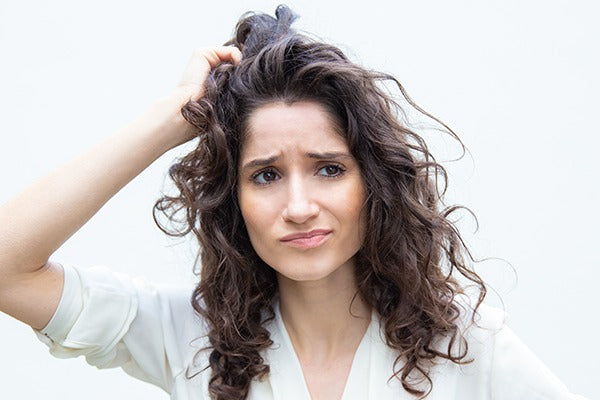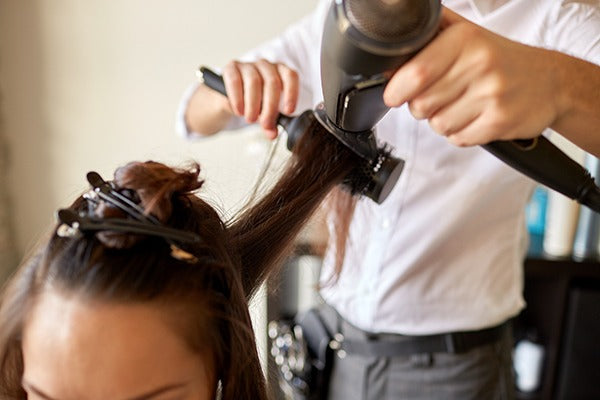A dry scalp can be frustrating for more than just one reason. Itching, flaking and hair damage are only a part of it. While this issue isn’t unusual, it can be challenging to rid yourself of a dry scalp without the help of proper hair care. Before delving into the solution, let’s first look at the few most common causes of dry scalp.
From environmental triggers to nutritional deficiencies, we'll get to the bottom of what causes dry scalp and provide you with effective solutions to restore your hair's natural moisture. Keep reading for more.
Environmental Factors
One of the surprising factors that can contribute to a dry scalp is the environment we live in. Our surroundings play a significant role in the health of our hair and scalp, yet it's an aspect that often goes unnoticed.
For starters, harsh weather conditions can strip away the natural oils that keep our scalp healthy. These extreme temperatures affect your scalp's health, whether it's the bitter cold of winter or the scorching heat of summer. The high humidity in summer does not allow the sweat to evaporate quickly, causing build-up on the scalp and weakening the scalp's natural barrier. In winter, on the other hand, the air is devoid of moisture and dehydrates the scalp, leaving it dry and flaky. Additionally, strong winds can exacerbate the problem by further drying out the scalp and causing it to feel tight and itchy.
Another environmental factor to consider is pollution. The pollutants and toxins in the air can settle on our scalp and clog the hair follicles. This can disrupt the natural balance of oils and lead to a dry scalp problem.

Hard water is yet another environmental culprit that can contribute to a dry scalp. Water high in mineral content, such as calcium and magnesium, can leave behind deposits on the scalp and hair. This build-up can prevent nutrients from penetrating the hair shaft and lead to dryness and flakiness. If you live in an area with hard water, investing in a hard water shampoo, such as iluvia’s Hard Water Shampoo, can help combat this issue.
Read more about reversing hard water damage here.
Ageing
As we get older, our skin ages as well. And while we pay a lot of attention to our face and body skin, scalp ageing is often overlooked.
Of course, one of the signs of our hair and scalp ageing is the growth of white hair. But that’s not all. As we age, the production of collagen and elastin decreases. The loss in elasticity weakens the scalp’s barrier, and it struggles to hold as much moisture as before, leading to faster dehydration.
The other sign of scalp ageing is the oil glands producing far lesser sebum, the natural oil that moisturises your hair and scalp. This also contributes to the dryness of your scalp. Scalp dryness is noticeable in the hair, too, in the form of dry, brittle hair that is prone to breakage.
While ageing cannot be slowed or stopped, lifestyle changes and using adequate hair care products can help slow scalp ageing and maintain its health.
Nutritional Deficiencies
Like the rest of our body, our scalp relies on a balanced diet to function optimally. When we don't provide our bodies with the necessary nutrients, it can manifest in various ways, including dry scalp problems. Certain vitamins and minerals play a big role in maintaining scalp health and moisture levels.
One essential nutrient that can impact the health of our scalp is omega-3 fatty acids. These essential fats nourish the hair follicles and help regulate oil production, which in turn prevents dryness. Foods like walnuts, flaxseeds and chia seeds contain omega-3 fatty acids.
Another nutrient that can affect scalp health is vitamin E. This antioxidant helps protect the scalp from environmental damage and keeps it hydrated. Foods high in this vitamin include almonds, spinach, sunflower seeds and avocados.
Additionally, a deficiency in B vitamins can contribute to a dry scalp. One of these vitamins, Biotin plays a crucial role in producing healthy hair and skin cells. Incorporating foods like sweet potatoes, almonds, and leafy greens into our diet can help ensure an adequate biotin intake.
By incorporating foods rich in these vital nutrients into our diet and ensuring we stay adequately hydrated throughout the day, we can help combat dryness and promote a healthier scalp.
Improper Hair Care
In addition to these factors, how we care for our hair can also play a significant role in the health of our scalp. Using harsh hair care products, frequent heat styling, and improper washing techniques can all contribute to a dry scalp.
Using products that contain sulfates, alcohols, fragrances or any other harsh chemicals can rid the scalp of natural oils, causing dryness and irritation. Opting for gentle, sulfate-free shampoos and conditioners can help maintain the scalp's moisture balance and prevent dryness.
Frequent heat styling, such as blow-drying and using flat irons or curling wands, can also cause the scalp to become dry. Excessive heat can deplete the scalp's natural oils, resulting in dryness and flakiness. Limiting styling tools or using them on a lower heat setting can help mitigate this issue.

Proper washing techniques are also crucial in maintaining a healthy scalp. Washing the hair too frequently or using hot water can strip away the scalp's natural oils, leaving it dry and prone to irritation. It is recommended to wash the hair every 2-3 days with lukewarm water and a gentle shampoo.
While a dry scalp can be due to any of these causes or a combination of a few, you should first identify your trigger. If you’re wondering how to fix a dry scalp, developing an effective hair care routine can go a long way.
The Best Dry Scalp Treatment
When scalp dryness is a major concern, look no further than iluvia’s Pro Maintenance System. The hair care system includes a gentle shampoo, hair mask and serum meant for dull, dry and damaged hair and a dry scalp – perfect for a beneficial hair care routine all year round.
Start by applying a generous dollop of the Sulfate Free Shampoo on wet hair. Massage in the shampoo, ensuring you evenly distribute it from root to tip and on your scalp. Developed with a micro-emulsion technology to provide a gentle yet effective cleansing experience, the shampoo will remove dirt, oil and build-up without stripping the hair and scalp of their oils and moisture. The shampoo also maintains the hair’s natural lipid barrier, further reducing dryness. This is why it is considered one of the best shampoos for dry scalp and dandruff.
After rinsing out the Sulfate Free Shampoo, apply the Hair Repair Mask to your hair and leave it on for five minutes. The hydrophobic hair mask repels moisture and is humidity-resistant to keep the hair and scalp from drying. It helps repair dry, brittle hair and prevent frizz, split ends and breakage.
End the session of dry scalp treatment at home with the Hair Protection Serum. Add a few drops of the serum into the palm of your hands and gently apply it from your hair's mid-lengths to the ends. Once your hair is coated with this serum, it will shield it from environmental triggers, such as moisture, pollutants and UV light. It also protects the hair from styling tools, which is also one of the causes of dry scalp.

Implement these strategies and restore your scalp’s health today. Get ready to bid farewell to that irritating dryness and say hello to a healthy, hydrated scalp!
Head to iluviapro.com to get started with the best dry scalp treatment.

